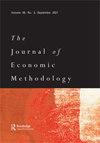行为福利经济学的偏好是什么?
IF 1.8
3区 经济学
Q2 ECONOMICS
引用次数: 2
摘要
与非行为形式的福利经济学或福利经济学领域之外的理论相比,行为福利经济学(BWE)赋予偏好不同的角色。特别是,BWE与其他形式的福利经济学的不同之处在于,它试图区分与福利相关和与福利无关的主观态度,这种主观态度是基于一些审议错误的概念。基于最近关于偏好解释的目的依赖性的争论,我认为对偏好的功能主义倾向理解对于BWE来说是不够的。相反,我区分了两个层次的功能分析——代数的和算法的——并认为是算法的层次,捕捉相关的心理过程和表征产生观察到的行为,这是BWE所需要的。本文章由计算机程序翻译,如有差异,请以英文原文为准。
What preferences for behavioral welfare economics?
ABSTRACT Behavioral welfare economics (BWE) assigns different roles to preferences than either non-behavioral forms of welfare economics or theories outside of the domain of welfare economics. In particular, BWE differs from other forms of welfare economics in its attempt to distinguish welfare-relevant from welfare-irrelevant subjective attitudes based on some notion of deliberation error. Based on recent arguments for the purpose-dependence of the interpretation of preferences, I argue that a functionalist-dispositional understanding of preference is not sufficient for BWE. Instead, I distinguish two levels of functional analysis – algebraic and algorithmic – and argued that it is the algorithmic level, capturing the relevant mental processes and representations producing the observed behavior, that is required for BWE.
求助全文
通过发布文献求助,成功后即可免费获取论文全文。
去求助
来源期刊

Journal of Economic Methodology
ECONOMICS-
CiteScore
3.20
自引率
8.30%
发文量
23
期刊介绍:
The Journal of Economic Methodology is a valuable forum which publishes the most current and exciting work in the broad field of economic methodology. The Journal of Economic Methodology addresses issues such as: ■Methodological analysis of the theory and practice of contemporary economics ■Analysis of the methodological implications of new developments in economic theory and practice ■The methodological writings and practice of earlier economic theorists (mainstream or heterodox) ■Research in the philosophical foundations of economics ■Studies in the rhetoric, sociology, or economics of economics
 求助内容:
求助内容: 应助结果提醒方式:
应助结果提醒方式:


